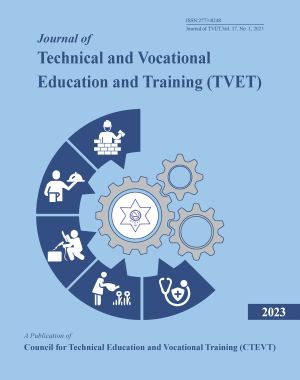Effectiveness of Vocational Training on Light Vehicle Mechanics in Underprivileged Children’s Educational Programs, Nepal
DOI:
https://doi.org/10.3126/tvet.v17i1.52419Keywords:
effectiveness, satisfaction, physical facilities, physical environmentAbstract
Training effectiveness is important for the employment of technical and vocational education and training (TVET) school graduates, such as light vehicle mechanics in the automobile industry. This study explored the training effectiveness of light vehicle mechanics in Nepal, with focus on students’ satisfaction with TVET school’s physical facilities and physical environment. The training effectiveness is explored among the sampled TVET graduates of CTEVT affiliated TVET schools, using quantitative method of research. The overall impression of the training was effective because the graduates responded positively about training. The schools did not fully achieve the objectives due to inadequate provision of modern technology. Thus, they pointed out the need for regular up-to-date tools and equipment as per need of the industry. Utilization of library facility and technology in the teaching- learning methods was equally needed. The skill mismatch could be solved by linking industry to the TVET training. This study may draw an interest of the TVET school leaders for taking effective measures to maintain quality of graduates, keeping in mind the industry needs. Similarly, future researchers may take reference when they want to explore the underlying causes of students’ satisfaction with physical facility and school environment, as well as training and skill mismatch in the labor market among the TVET school graduates.
Downloads
Downloads
Published
How to Cite
Issue
Section
License
© CTEVT All rights reserved
CC BY-NC This license enables reusers to distribute, remix, adapt, and build upon the material in any medium or format for noncommercial purposes only, and only so long as attribution is given to the creator.




